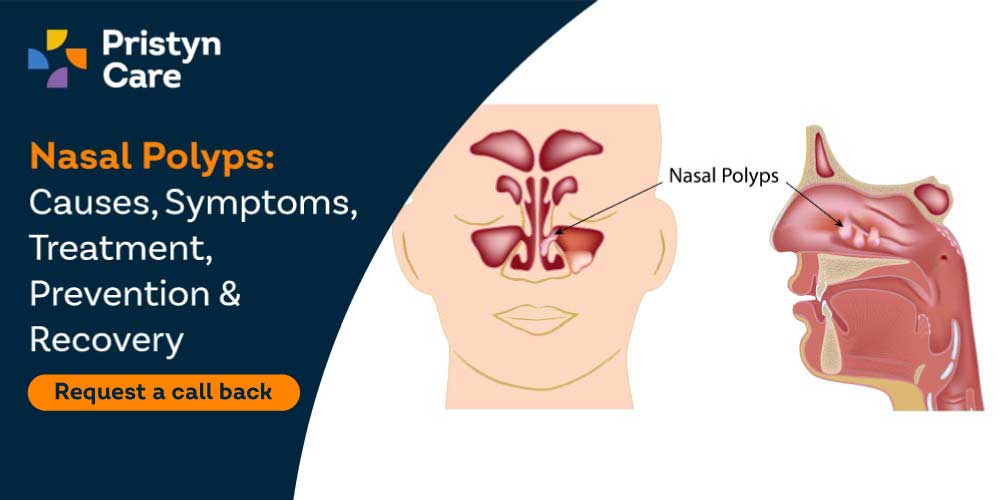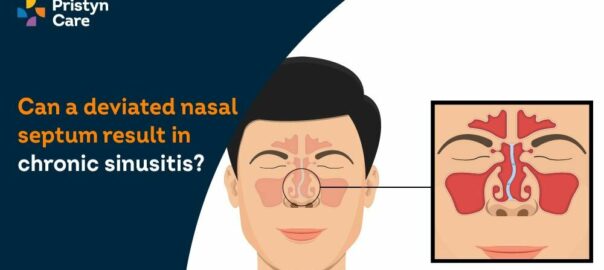![]() Views: 4,402
Views: 4,402
Nasal Polyps: Causes, Symptoms, Treatment, Prevention & Recovery
Normally, polyps occur in both nasal passages simultaneously.
Dedicated Support at Every Step!
Our Doctors are available 24 hours a day, 7 days a week to help you!
Table of Contents
What are the causes of nasal polyps?
While the exact cause of nasal polyp formation is unknown, most doctors believe that they occur as a result of chronic inflammation in the mucosal membranes of the nose and sinuses. While they can occur in the part of the nasal and paranasal cavity, they usually occur near the eyes, nose, and cheekbones.
When the nasal or paranasal mucosa undergoes inflammation for a long time, it becomes red and swollen, which eventually forms cyst-like growths called polyps. They can go unnoticed for a long-time as they don’t have any nerve sensations, but when they cause significant blockage of the airway, they need to be treated immediately.
Nasal polyps are very common in patients with allergies due to long-term irritation and swelling, recurring infections, drug sensitivity, and some immune disorders. They are also commonly diagnosed in people suffering from asthma, allergic sinusitis, cystic fibrosis, Churg-Strauss syndrome (inflammation of blood vessels), Vitamin D deficiency, etc. People with sensitivity to anti-inflammatory drugs like ibuprofen and aspirin are also prone to polyps.
No Cost EMI, Hassle-free Insurance Approval
How do nasal polyps affect health?
Small nasal polyps are generally asymptomatic, however, large growths can block the nasal passages and cause severe breathing distress. They can even result in loss of smelling and taste sensations and increase the probability of nasal and sinus infections.
The most common symptoms of nasal polyps are:
- Runny nose and persistent stuffiness of the nose
- Postnasal drip and frequent nosebleeds
- Decreased or absent sense of smell
- Decreased sense of taste
- Facial pain or headache
- Pain in teeth
- Heaviness on the forehead and face
- Snoring
If you do not get proper treatment for nasal polyps, it can potentially result in complications like obstructive sleep apnea, asthma flare-ups, recurrent sinus infections, etc.
When should I consult a doctor for treatment?
Most people confuse nasal polyps for cold and flu infections because their symptoms are so similar. The most obvious sign of a nasal polyp is that your symptoms are worsening instead of improving despite medical treatment. You should consult a doctor if your symptoms persist for over 10 days.
You should seek immediate attention if you have serious difficulty in breathing, double or reduced vision, severe facial swelling, headache, etc. You can consult your primary care physician for the initial consultation, but only an ENT specialist will be able to treat nasal polyps for long-term relief.
How are nasal polyps treated?
The main goal of nasal polyp treatment is to reduce their size or eliminate them completely to provide relief from associated problems like sinusitis, asthma flare-up, etc. Generally, the first approach to treatment is medications. Medical treatment generally includes nasal corticosteroids or oral/injectable corticosteroids. In addition to these, you may also need medications for symptomatic relief, i.e., medicines for sinusitis, pain management, etc. You may also need medications for allergy management if you have allergies.
However, the patient may need surgical intervention if medical treatment does not work in shrinking the polyps. The most preferred surgery for nasal polyps is FESS (Functional Endoscopic Sinus Surgery). During endoscopic surgery, the ENT surgeon inserts an endoscope through the nasal passages and uses tiny instruments to remove the polyps and improve airflow through the nasal and paranasal areas. Since no major cuts or incisions are performed during the surgery, it is very beneficial for recovery.
How long does it take to recover from nasal polyps?
The exact recovery time after nasal polyps varies depending on the severity of the condition, the size of the polyps, the type of associated symptoms, the type of treatment, etc. With medical management, it normally takes around 1-2 weeks for obvious improvement in the symptoms. However, most patients are advised to take medicines for 4-6 weeks to prevent a recurrence.
If surgery is required, most patients can start performing light activities and return to work within one week; however, exercising and strenuous activities have to be delayed until at least 2-3 weeks after the surgery. Complete recovery usually takes about 4-6 weeks.
Can the formation of nasal polyps be prevented?
Prevention of nasal polyps is important for patients with its risk factors and for patients undergoing treatment to prevent a recurrence. Some basic preventive tips the patient can follow for nasal polyp prevention are:
- Manage your allergies and asthma properly, as per the doctor’s instructions. If your current treatment strategy isn’t effective, then consult your doctor to update it.
- Avoid nasal irritants like known allergens, pollens, tobacco smoke, chemical fumes, dust, fine debris, etc., that can contribute to nasal inflammation.
- Maintain cleanliness and good hygiene around you to avoid infections.
- If you live in dry regions, use a humidifier to aid your breathing and airflow.
- Use a neti pot or similar nasal rinse kits to clean your nasal passages with lukewarm saltwater/saline water.









